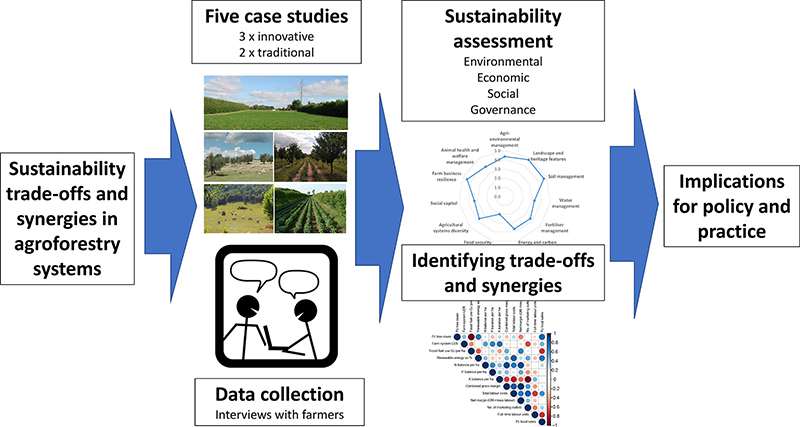New paper published from the SustainFARM project team. A real team effort with Laurence Smith, Samantha Mullender, Sally Westaway and Jo Smith contributing authors from ORC.

Smith LG, Westaway S, Mullender S, Ghaley BH, Xu Y, Lehmann LM, Pisanelli A, Russo G, Borek R, Wawer R, Borzęcka M, Sandor M, Gliga A, Smith, J (2022) Assessing the multidimensional elements of sustainability in European agroforestry systems. Agricultural Systems. Elsevier. Volume 197, March 2022, 103357 https://doi.org/10.1016/j.agsy.2021.103357
Agroforestry is gaining interest in in Europe however the trade-offs associated with its uptake are still uncertain.
The objective of this study was to explore the sustainability trade-offs and synergies associated with a range of agroforestry systems in Europe and assess the underlying reasons for different performance regarding environmental, economic, social and governance domains.
Five case-studies of agroforestry from nothern, eastern and southern Europe were assessed using an established sustainability assessment tool, the Public Goods tool (PG tool). The case studies were selected to represent a range of innovative and traditional systems, encompassing arable and livestock, wood fuel and tree fruit crops.
All five of the case studies were performing well across a diverse range of sustainability criteria, with average scores of three out of five or higher across the assessment categories. Social capital and animal health and welfare management scores were particularly high, due to high rates of on-farm employment of between 0.4 and 2.3 full-time labour units per hectare, and a high volume of local sales alongside effective health planning and husbandry through health planning and a lack of restrictions on natural behaviour. Land Equivalent Ratios were greater than 1 within each case and were particularly high for established silvopasture systems (over 1.5). Fossil fuel use was considerably lower than the industry average in most of the case studies (between 17 and 92% of the country-average per hectare for three of the cases). Economic performance was highly variable, with high labour costs contributing to negative margins.
The assessments show that agroforestry systems have considerable potential to contribute to multiple sustainability objectives, and that environmental and social sustainability objectives are particularly well addressed through increased efficiency of land-use, increased opportunities for on-farm employment and engagement with local communities. However considerable financial barriers still exist and may prevent its further uptake. Promoting the future uptake of agroforestry in Europe therefore requires the commitment of multiple actors in supply chains to plan policies, farm-practices and knowledge exchange that can support the delivery of sustainability benefits.
https://www.sciencedirect.com/science/article/abs/pii/S0308521X21003103?via%3Dihub
